
The Mechanic of Love
Jaime Hernandez talks about life with Maggie &
Hopey
Conducted by Chris Knowles
Transcribed by Jon B. Knutson
From Comic Book
Artist #15
Jaime (pronounced "high-me") Hernandez is perhaps the
finest cartoonist to emerge from American comic books in the 1980s.
Add one part Dan DeCarlo, throw in a batch of Alex Toth, with a pinch
of Charles Schutz and Hank Ketcham for flavor, mix in a whole lot
of personal insight, garnish with a rare respect for women, and you
might get an idea of what the creator of Maggie, Hopey, Penny Century
and numerous other females is all about. Jaime was interviewed by
phone in Jan. 2000 and he copyedited the transcript.
Chris Knowles: When I talked to Gilbert last night, the question
I started off with was, what were you doing in 1975? How many years
younger are you than Gilbert?
Jaime Hernandez: A couple.
Chris: Okay, so I'm going to start off with you: What were
you doing in 1977?
Jaime: In 1977, I was a senior in high school, and I had not
discovered punk, but I had heard of it. [laughs]
Chris: Were you listening to Kiss at the time, like Gilbert
was? [laughs]
Jaime: In '75 and '76, I was... by '77, they were disappointing
me already. I think the "Destroyer" days are gone. Those
"Love Gun" days. I just don't like them that much any more,
but I was the biggest Kiss fan in the world in 1975.
Chris: Gilbert said that Star Wars had an amazing impression
on him in 1975.
Jaime: Yeah, I guess I would say not as big on me, but big
enough. I saw it later than most people, but I was bowled over, and
Star Wars was the thing, and all that stuff. I'd graduated high school
and I was thinking about breaking into fanzines. Comic fanzines, little
cheap things or just these real small-time publishing things.
Chris: I understand you don't do a lot of photo referencing.
Jaime: Oh, I do that on purpose, only because I've always
hated looking at some comic book and saying, "Oh, I've seen that
photo before." [laughs]
Chris: What about to draw, like, the way a certain car looks?
Jaime: Oh, well, of course. You need that. Most of my cars
are made-up, and you can tell.
Chris: Some sort of cross between an old Studebaker and an
old Edsel or something. [laughter]
Jaime: Yeah. That's why they're in the far background. [laughs]
Chris: But you captured the essence, like a Zen thing.
Jaime: That's what I'm trying, I'm trying to put that across,
because I'm really lazy about research. I almost do no research. It
shows sometimes. [laughs] It's... I can't really explain how I do
it, where I get my inspiration, you know? It just soaks into me and
comes out of my hand. It's weird.
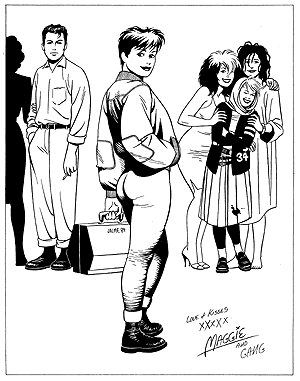 Unpublished Maggie pin-up courtesy of and ©2001 Jaime Hernandez.
Unpublished Maggie pin-up courtesy of and ©2001 Jaime Hernandez.
Chris: So, you were this wild punk rocking kid who was drawing
in a style that was so traditional and conservative, really. How did
that dichotomy address itself to you? Did that figure in your work?
When you were doing the work, you're drawing in such a style that's
so descriptive, and doesn't reflect the punk aesthetic.
Jaime: What it is, I want the presentation to be clear as
possible. I didn't want to fool anybody... I wasn't trying to make
a fool of anybody, I wasn't trying to dazzle them with my new groundbreaking
work, that I'm going to be the next Warhol. It was pretty much "These
stories, this world, these people are interesting enough where they
don't need help, they don't need any help from stylizing or anything
like that." So, I'd pictured making a movie, a documentary of
these people.
Chris: So you didn't need to play with panel arrangements
or rendering styles.
Jaime: Actually, when I got older, it would bug me when I'd
see a comic like that. The frame, to me, is just the frame. It's the
picture you look at, not the panel.
Chris: Were you ever tempted to just go to a strict six- or
nine-panel grid? [laughs] Like Ditko?
Jaime: That's basically what I've done. I've been probably
using the same grid, mostly since the sixth issue. Just the basic
six-panel or nine-panel, two tiers, three tiers... it's all been pretty
basic and static, just because the whole layout of the panels is not
that important to me, it's the actual pictures you're reading.
Chris: A lot of panels that you would draw, particularly scenes
with somebody being pulled over on the side of the road by the cops,
or in particular, a lot of the things at night with the lighting,
I'd never seen in comics before. I'd never seen that kind of documentary
reality on the page. Were these events from your life you were retelling
in different ways in the story, or is this something that you just
collated, that became so clear to you that when you looked at the
panel? There are certain artists I've seen, I call this "the
vision." What "the vision" is, I imagine these artists
looking at the frame, and seeing somewhere in their mind a scene taking
place in front of them. Jack Kirby was the most famous example of
this. I was always struck that it was almost like he saw this taking
place, not as a drawing, but as reality, and he was tracing it on
the page. Was it like that for you?
Jaime: Yeah. When I'm picturing a panel, I'm picturing what
I saw that day, or I'm picturing what it would look like, and I just
translate it to those little lines and blacks and whites, you know?
[laughs] I guess I'm always observing. I remember one time I told
somebody at a convention once that was asking me, "What should
I do about art? What should I do?" I'm not a teacher, you know?
Chris: You're an artist.
Jaime: Yeah. So, the best thing I could tell him-which I thought
was maybe a cheap answer-was, "I'm drawing 24-hours a day, or
all the hours I'm awake, I'm drawing. I'm walking down the street,
I'm drawing in my head, I'm drawing that street in my head."
I thought the person was going to go, "Oh, you're so full of
sh*t!" [laughs] Adrian Tomine was standing back there, and he
goes, "That was great what you said!" And I said, "What
did I say?" [laughs] I mean, it's the truth, but it sounds corny.
All day long, I'm observing the way the world looks, and how I translate
it into the comics by making it seem real, even if it's just those
stupid lines. [laughs]
Chris: Would it be fair to say that you-this is a cliché,
but-that you have a photographic memory?
Jaime: No, I've never... I don't think so, otherwise I would've
gotten As in school my whole life.
Chris: But as far as your drawing is concerned, maybe not
that you could have instant recall of a specific thing, but things
that really made an impression on you were "photographically
frozen" in your mind.
Jaime: I guess so. It's not exactly like a snapshot in my
mind, but it's just all 3-D in there, you know? When I'm thinking
"Hopey's in front of this apartment house," and I go, "What
kind of apartment house should it be? Maybe it should be one of those
I used to see on Third Street, something like that." That's pretty
much the way I approach it.
Chris: Is this a frustrating thing for you? Do you have an
image that's so clear in your mind, when you put pen to paper, it
just does not come out?
Jaime: Sometimes.
Chris: Do you end up tearing a lot of pages up and starting
over?
Jaime: No, but I'm hoping I'm going to get it the next time.
I can get it across enough for the reader to understand, but hopefully,
I will learn from this, and it'll come out better the next time. I
don't worry about it as much as I used to, because I've learned to
accept my limitations, and not fall back on my limitations, but accept
that, "look, man, you ain't Rembrandt!" [laughs] "Just
do your best!"
Chris: Well, Rembrandt posed everything. [laughter]
Jaime: Right. But just, "Do your best, you ain't an architect,
you're not going to draw that perfect house, but you're going to draw
a house good enough to make the reader know it's that house."
Chris: The thing about your backgrounds is they've always
seemed to be more impressionistic than anything, and the focus seemed
to be on what the characters were doing. Was that your main obsession?
Jaime: It's usually because what they're saying is very important
to what's going on, so the focus will always be on what they're saying,
what their face is saying, and the backgrounds are just so you know
where they are. [laughs] It's also because I like drawing people more
than I like drawing buildings! [laughs] Being a storyteller of people,
about people, that's why I focus, they're always the focus.
Chris: The great line that everyone always said about Love
and Rockets, and Gilbert actually agreed to, was that you were the
better artist and he was the better storyteller, and that seemed a
great insult to his drawing and to your writing. I would say that
you are as concerned with writing and storytelling as you were with
the drawing, and he was as considered with the drawing as he was with
the writing, and it's just that the way he developed is that his drawing
became maybe more subordinate to the writing than yours did. I mean,
I don't know if that's true, but I was always really shocked when
it became, "Gilbert's the better writer," to some people
saying, "Well, Jaime can't really write." [laughs] "But
his drawings are beautiful." I mean, did you pay any attention
to that kind of stuff?
Jaime: Oh, I would hear it, and then I'd say, "Oh, I'll
show you! Wait 'till you see this next issue!" I was still cocky
enough where that stuff doesn't bother me for long.
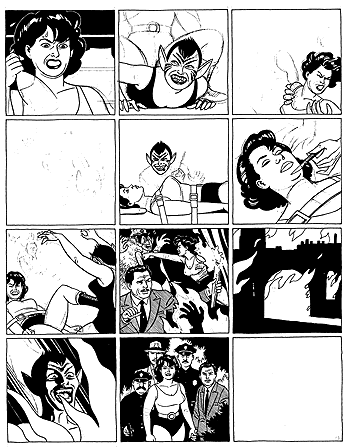 Unfinished Rena story by Jaime from the late 1980s. Courtesy of and
©2001 Jaime Hernandez.
Unfinished Rena story by Jaime from the late 1980s. Courtesy of and
©2001 Jaime Hernandez.
Chris: I think maybe a lot of people reading Love and Rockets
didn't know what you were talking about, didn't know the world you
were describing, and this gets back to what we were talking about,
which was that your drawing style was to service the incredibly exciting
and dynamic world, that was far more exciting and real than what was
going on in a typical Marvel comic. I think perhaps people didn't
have the frame of reference for it. And to show the universality of
the human condition, there were certain scenes in Love and Rockets
comics that were torn straight out of my life at the time, because
I was hanging around the punk rock scene in Boston in the early '80s,
and I remember hiding in strange places [laughs] and in nightclubs
and listening to "Police Story" for the first time, and
piling into the car to go to a show-I think maybe the typical comic
reviewer or the typical Comics Journal writer didn't have any background
in that.
Jaime: They didn't live it.
Chris: You hung in a lot longer in the punk rock scene than
Gilbert did and the punk rock scene was getting pretty violent around
this time. Was it violent around Oxnard? Or was that just down in
Huntington Beach?
Jaime: Oh, yeah. I was there at the height of it... I would
go to LA after a while, and I'd be watching a band, and all of a sudden,
I'd be pushed from behind, and I'd look, and there'd be this wall
of guys, just because I wasn't wearing the same boots they were wearing.
That's when it just wasn't fun anymore, you had to watch your back!
Chris: What year was this?
Jaime: I would say already by '80 in LA.
Chris: I was under the impression that you stuck in a little
longer.
Jaime: No, I did, but...
Chris: You weren't in "The Pit." [laughs]
Jaime: I stuck on the rim after that. It just got so clique-y,
and it just became high school and I was through with high school.
So, I guess I mostly hung out in Oxnard by then, and it was still
a small enough scene where friends were friends, and I knew mostly
everybody, so there was no threat going on there.
Chris: I remember in the early days in Boston, there was one
place that was a Karate studio during the day, and it became a place
for shows at night, and the cops shut it down every time there was
a show! [laughs] Then there was another place that was an eighth-floor
loft that was actually the RCYB (Revolutionary Communist Youth Brigade)!
[laughs] A lot of bands would have to have their lyrics approved.
[laughs] At the beginning, if you got knocked down while you were
dancing, somebody would pick you up. Then, it got to the point, if
you got knocked down while you were dancing, 25 jocks would pile on
you and start beating the hell out of you! [laughs]
Jaime: Exactly, that's the same thing that happened here.
I just kind of got on the rim, outside, and just stuck with my friends.
By that time, there were enough people in Oxnard that when we would
go to LA, I would hang out with them. I was never a popular LA punk,
I was there.
Chris: You weren't a scene-maker.
Jaime: Yeah. So, while I was having a lot of fun, they couldn't
care less who I was. When it started to become high school, jocks
and all this sh*t, I thought that's what I got away from, that's what
I became a punk for, to get away from that sh*t! So, I just coped
with it, because I still loved the lifestyle. I still loved the idea,
I loved the whole bit of strength I had that I got from it, I just
loved the whole idea! But I had to avoid the whole cliquish jock thing,
and after a while, people in Oxnard started getting clique-ish and
stuff like that! So, I just said, "F*ck you, I'm going to draw
my comics. F*ck you, I'll leave."
Chris: One of the interesting things that I remember you saying
in an earlier interview about the punk mentality influencing your
work is that the whole punk cliché was "Do it yourself."
Comics were really something you did do yourself! Nobody was sitting
there inking and editing you and changing your work.
Jaime: Right. In the beginning, we didn't know what kind of
audience we would have, or if we would have an audience. At the same
time, we were like, "Well, f*ck it, we're going to do it anyway.
We knew this was good. We know these stories are worth telling. So,
we'll get there without your help." I was cocky enough to pull
it off! You know, the whole punk do-it-yourself thing was also because
it helped me grow up a lot. I mean, it wasn't just the music scene,
it was just... I just saw the world in a big scope for the first time,
and I was 18 to 21, those years, so it was just very eye-opening,
and I'm glad it happened at that point.
Chris: One of the things I always thought was interesting
was that there were a lot of kids in the punk scene reading comics,
but there really wasn't a lot of kids in the punk scene drawing them.
I guess it was easier and more fun to be in a band; I mean, I remember
seeing bands who just recently picked up their instruments play for
2,000 kids at a nightclub in Boston! [laughs]
Jaime: Right. [laughs]
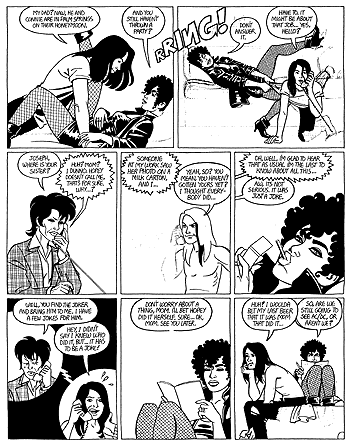 Self-rejected Love and Rockets page from the "Lost Hopey"
era. Courtesy of and ©2001 Jaime Hernandez.
Self-rejected Love and Rockets page from the "Lost Hopey"
era. Courtesy of and ©2001 Jaime Hernandez.
Chris: Were you guys ever approached by any fanzines, like
Maximum Rock and Roll, or Flip Side, or anything like that, to contribute
work?
Jaime: No. At the time we were invisible. In LA, I was just
a kid hanging out from out of town. I didn't have any connections,
I didn't know anybody in the bands, I just went to go see them and
support them.
Chris: Around '84 or '85, when Love and Rockets was really
kicking in, did you start to get a lot of interest from the music
world to provide some visuals?
Jaime: Just basically local bands doing flyers and record
covers. Also by this time, we were so cocky that I didn't need them
anymore. When people did ask, I didn't need them, I had Love and Rockets,
I had my own forum, I didn't need to have that stepping stone of getting
to someplace else. Love and Rockets was the place I was getting to.
Chris: Yeah, you were already there.
Jaime: Yeah, and call it cocky, but I've been doing it for
almost 20 years now! [laughs] I mean, it worked! It was kind of payback
for being ignored for so long... . which goes back to being a young
Mexican-American growing up in Southern California, it's the same
thing, just it was my revenge.
Chris: Did you feel you had to develop a second skin, just
because of racism or prejudice at the time?
Jaime: Okay, this also starts when the comic took off. It
didn't matter if I was a Mexican any more. I had the comic book, and
I was going to show the world. Kind of like, "Now you guys can't
ignore me." It was just a number of things, it was revenge from
the school bully back in school, all that. It was just a number of
things built up, and when I found my outlet, boy, try and stop me!
I still use that attitude now.
Chris: So this "comic destroys fascists," right?
[laughs]
Jaime: Yeah, and mighty is the sword. While all this anger
and revenge is happening, it was most important for me to create great
art. It was not so much angry art, the anger just helped me put it
out.
Chris: You weren't Sue Coe, in other words.
Jaime: My comics aren't there, every panel, just going "F*ck
you! F*ck you! F*ck you!" It's more of a feather cutting your
face. [laughs]
Chris: Well, at the time you and Gilbert being kind of anomalous
in a lot of ways, because at the time, you did have people like Sue
Coe, you had RAW, which is explicitly political and angry, you had
World War III Illustrated, you had a lot of comic work starting to
show up in a lot of punk 'zines like Maximum Rock and Roll that was
ugly and angry, and it was kind of like while you were putting the
punk life on paper, they were trying to put the punk music on paper,
it seems. You were never tempted to ever do that kind of stuff.
Jaime: No, because there was too much... there was still a
lot of beauty there to be in... I don't know how to explain it. I
wasn't the kind of angry guy that wanted to destroy it, I wanted to
create it; I just wanted to... I'm too much of a romantic to destroy
anything. I found ways of being angry and portraying beauty at the
same time, you know?
Chris: Was there a lot of anger in your work?
Jaime: Not anger, but... okay, anger is the wrong word, I
guess it's just was going to show you that I'm worth something, that
I'm here. Gilbert has said this before, it's my love letter to the
world.
Chris: That's the one thing that I think really set your work
apart from a lot of Fantagraphics Books is that there was such a sense
of humanity to the material, and that was intentional.
Jaime: It was very intentional, because humanity's the greatest
thing in the world, no matter how ugly it gets! [laughs] It's still...
humankind just will endure, that's the way I looked at it.
Chris: One thing I was telling Gilbert that I really appreciated
about what he did with the Palomar stories is that growing up I thought
everybody living in Central America was living in a grass hut, you
know? When he came out with the Palomar stories, it was just incredibly
humanizing. I didn't think I was like Mike Stivic saying, "Oh,
I'm relating to the plight of the Mexican-American people," it
was like, "Oh, yeah, I'm reading this comic, and this guy's talking
about my life, it's just over in LA." It didn't occur to me,
there was no ethnic separation in the work. Do you understand what
I'm saying?
Jaime: Yeah. That was partly intentional, that while I was
doing all these ethnic people, it was pretty much an international
thing. I mean, anybody could relate, that was the point.
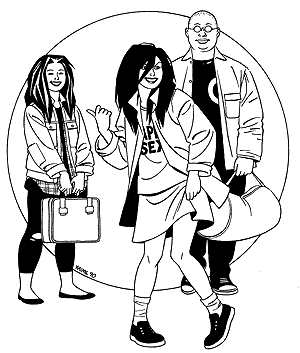 Previously unpublished (and self-rejected) Love and Rockets T-shirt
design by Jaime. Courtesy of and ©2001 Jaime Hernandez.
Previously unpublished (and self-rejected) Love and Rockets T-shirt
design by Jaime. Courtesy of and ©2001 Jaime Hernandez.
Chris: Did the success of Love and Rockets put a lot of pressure
on you guys, or were you guys just soaking it up?
Jaime: Pretty much enjoying the freedom to continue.
Chris: At what point did it become financially rewarding?
Jaime: Oh, financially? I'd say... early issues, like eight
or nine, maybe later than that, 10 or 11 was when I realized, "Hey,
I can live off this stuff!"
Chris: Was this a living like, you know, the kind of job a
young 20-year-old guy would get ?
Jaime: Okay, it just afforded me to buy... [laughs] I could
afford a new car and I got my own studio apartment.
Chris: Was the punk lifestyle continuing? Were you living
a Bohemian lifestyle at the time?
Jaime: I guess in my mind, but let's put it this way: I've
never had a mattress on the floor. I've never wanted to live like
that.
Chris: So it isn't Kraft Macaroni and Cheese every night.
[laughs]
Jaime: Oh, sure, there was that! I guess because I'm not a
smoker, it wasn't smoke-filled. I mean, in the morning, I'd throw
out the beer bottles, they didn't lay there for a week. I didn't want
to be distracted by all that stuff, I pretty much wanted to be able
to live like a human being, and I'm not saying become normal or anything,
but I was never thrilled by decadence. Not in my own surroundings,
my small surroundings. I loved experiences with friends, and things
like that, and observing friends, my decadent friends, but then I'd
go home and I'd be pretty safe. [laughs]
Chris: Was it Flaubert who said, "Be staid and conservative
in your lifestyle so you can be brave and daring in your art"?
Jaime: There you go.
Chris: Is that pretty much the general idea?
Jaime: Yeah. I mean, I didn't think too hard about it, it
just turned out that way. It was like, "Okay, I've got a bed,
I can go to sleep any time I want; I don't want to share the bed,
I don't want to live with five people." I just always knew I
needed my own space. Unless I had a girlfriend or something, or when
I got married, and all that. But first, I was pretty much wanting
my own thing, apart from the world, to... just have my own space that
I was in control of.
Chris: Love and Rockets was starting to get popular, and I'm
wondering how much interest you're starting to get from all the publishers
and other editors. I mean, we know there was Mr. X. Was there anything
that you'd like to say about that experience?
Jaime: Mr. X was in a time when we were flying high, so we
thought, "Let's go for it." It just turned out pretty sour.
It was over.
Chris: All of a sudden, it wasn't DIY anymore.
Jaime: I kept myself in a position where it still was, where
I was still able to have the freedom I... it was just drawing comics,
just like Love and Rockets, it just was for somebody else.
Chris: But you weren't writing the stories.
Jaime: Right. That's the part we didn't like, that it didn't
have that personal Love and Rockets feel. But you know, I had a little
fun with it, until it just got ugly with the publisher, and then it
also started getting in the way of the Love and Rockets creating part,
and after that unfortunate incident, it just made me want to do Love
and Rockets more. Do my own thing.
Chris: Was it kind of like the guy who cheats on his wife
and gets burned, and then becomes the loving, faithful husband? [laughter]
Is that what it is?
Jaime: Gee, I never thought of it that way! [laughs]
Chris: Basically, you guys stepped outside the fold, and it
didn't...
Jaime: It didn't work our way, so we went back to our way.
Chris: Were people from Marvel and DC calling you, or people
from First and Eclipse, other publishers? Your work was seen as the
marquee aspect of Love and Rockets. Did they want a little of that
magic for themselves?
Jaime: What they wanted was Love and Rockets. I don't think
they cared if it was us! [laughs] They just wanted that name. That's
the impression I got from a lot of them, was just kind of like, "Okay,
Love and Rockets, we want Love and Rockets. Who are they? Who are
these guys?"
Chris: Did they call you? Would you get approached at conventions?
Jaime: Mostly, at conventions, someone would say, "Have
you ever thought of changing publishers?" Or, "Have you
ever thought of this or that?" They would just throw out ideas,
and we'd go, "Well, yeah, maybe we'll talk," and then when
they'd leave, I'd go back to Love and Rockets. [laughs]
Chris: So you weren't having people offering you Wonder Woman
or something.
Jaime: No. Once in a while, they would say, "Oh, we'd
love you to do something," and I'd go, "Okay, later."
[laughs]
Chris: It didn't even occur to you.
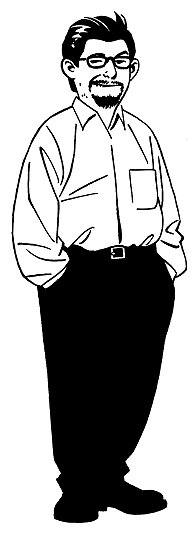 Self-caricature by Jaime from L&R #40. ©2001 Jaime Hernandez.
Self-caricature by Jaime from L&R #40. ©2001 Jaime Hernandez.
Jaime: I didn't hold my breath, because like I said, I didn't
need them. I wasn't trying to burn bridges, but it was kind of like,
"Look, you like my comic, let me be free to do it!" [laughs]
That's the way I looked at it.
Chris: So it wasn't like, say you were in a parallel situation
in Hollywood, if Love and Rockets was this hot indie film, all of
a sudden, people would be offering you Pauly Shore vehicles. It wasn't
anything like that.
Jaime: No, although I don't know what people were saying behind
our backs. I don't know. I mean, Hollywood had been beckoning for
years, we'd been doing power lunches for longer than I can remember,
but nothing ever came out, because they didn't know what to do with
us, kind of like, "I love what you do, but what is this?"
[laughs] It's kind of like, "Well, we're the only guys who know."
Chris: It's just good old-fashioned storytelling.
Jaime: That's what confused them, I think. [laughs] No big
hook, no big concept behind it. Just really basic storytelling, like
you said.
Chris: So, some other alternative comix start to trickle in,
but don't really make much of an impression, and then we hit the watershed
year of 1986, and a couple of things happened then. One is that Dark
Knight and Watchmen show up in the mainstream, and start everybody
talking about comics, and simultaneously, you and Gilbert are both
doing the best work of your lives. You were doing "The Death
of Speedy Ortiz" storyline at that point, and Gilbert was doing
"Human Diastrophism." Now, when "comics got hot,"
and it started to get all this press outside, and you started seeing
articles in Rolling Stone and Spin and all over the place, what kind
of effect did that have on you guys? You guys were mentioned along
with a lot of other stuff that really didn't have a lot to do with
what you were doing.
Jaime: Yeah. I know I'm going to make a lot of enemies in
this interview, but I didn't see us in the same boat they were. I
always thought of us as a separate thing, because I didn't see us
doing the same thing.
Chris: Comics will eternally be viewed by the outside world
as a genre. Comparing you to Dark Knight was kind of like comparing
X to Judas Priest.
Jaime: Yes, it was frustrating, because all our careers, we
would always be mentioned alongside...
Chris: ... guys that you really didn't want to be associated
with?
Jaime: Not that we had anything against them, we were just
saying something else, you know? We were doing something that... it
just wasn't the same thing. I mean, I can look at it and say, "Well,
it was all comics, that's wonderful, let's have more comics."
But I just had my mind on a different thing.
Chris: Well, how did you react? I mean, Frank Miller was a
huge fan of yours, Alan Moore was a huge fan of yours-you had sort
of the cream of the mainstream crop giving you guys a lot of great
lip service. Did that feel strange to you? Was that a strange position
for you to be in?
Jaime: I'm going to say the first humble thing in this whole
interview. [laughter] I was very appreciative, it was very nice. I'll
take it where I can get it, you know? I mean, [laughs] I never close
the door on anybody, I never tried to burn bridges... although along
the way, a bridge will be burned. [laughs] I guess I've always looked
at it as between us and them, kind of like, "Okay, we're going
to do ours, and you can go ahead and do yours, and then we'll see
ya." I don't know, I don't mean to make it sound like they don't
count, but I didn't... we weren't doing what they were doing! [laughs]
(For the rest of the Jaime Hernandez interview, as well as interviews
with brothers Gilbert and Mario, be sure to order a copy of COMIC
BOOK ARTIST #15, on sale now!)
To make subscription and back issue orders easier for our readers (especially
those overseas), we now accept VISA and MASTERCARD on our secure
web store! ( Phone, fax,
mail and e-mail
accepted, too!)
 

Sign up here to receive periodic updates about what's going on in
the world of TwoMorrows Publishing.

Click here to download
our new Fall-Winter catalog (2mb PDF file)
|
